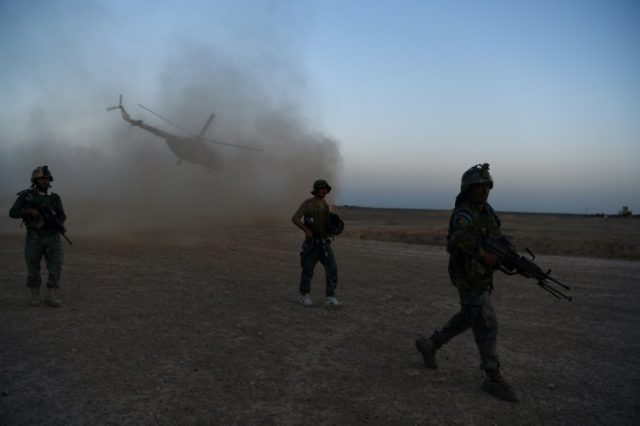The Afghan government may get to enjoy an unprecedented respite from the nearly 17-year-old war if the Taliban honors its three-day ceasefire that started Friday in tribute to the Eid al-Fitr holiday, marking the end of the Muslim holy month of Ramadan.
“This is the first time the Taliban had declared a nationwide ceasefire in the nearly 17-year conflict,” the Agence France-Presse (AFP) agency acknowledges.
According to a Breitbart News analysis, Taliban jihadists have been on a killing spree as the most prolific Islamic terrorist group so far during the holy month, which started on May 17.
Initially, the terrorists ignored the U.S. military and United Nations call for the Taliban to embrace Afghan President Ashraf Ghani’s offer of a ceasefire and official recognition as a political group at the beginning of Ramadan, choosing instead to set their own terms.
About three weeks into the holiest month for Muslims, the Taliban announced its first ceasefire in Afghanistan since the start of the U.S.-led war in 2001, noting that it would take place during the Eid holiday and exclude foreign troops.
The Taliban’s Eid truce came days after Ghani again made a U.S.-backed Ramadan ceasefire offer to the terrorist group, excluding attacks against other jihadists organizations in the country, namely the Islamic State (ISIS/ISIL).
U.S. military forces and their NATO allies vowed to honor Ghani’s Ramadan truce, announced on June 7.
“The cessation in hostilities is actually two separate, unilateral cease-fires — one by the government, which began earlier this week is expected to last about a week, and an overlapping three-day cease-fire by the Taliban,” the National Public Radio (NPR) notes.
AFP adds:
Afghans greeted the beginning of Eid with prayers on Friday as the Muslim holiday dawned in peace for the first time since the 2001 United States led invasion, after the Taliban agreed to an unprecedented ceasefire.
Flocking to mosques for special morning worship marking the first day of the festival, youngsters in the war-battered country expressed cautious optimism, following the suspension of fighting between Afghan security forces and the militants.
Although the Taliban said its ceasefire does not cover foreign forces, Hibatullah Akhundzada, the chief of the Afghan Taliban, this week renewed the group’s calls for direct talks with the United States to end the war in a statement personally signed by the leader stressing that the withdrawal of “occupying forces” is the “only path” towards peace.
The Taliban has for years maintained the complete withdrawal of U.S.-NATO forces as a precondition for peace negotiations, but America has refused to abide.
U.S. Gen. John Nicholson, the top commander of American and NATO forces, and a top United Nations official have welcomed the ceasefire, arguing that it shows that there is an overall desire for peace among the Taliban.
Gen. Nicholson told NPR last week after Kabul announced its truce:
This cease-fire is in response to a call from 3,000 religious scholars who on Monday called on the government and all belligerents to engage in a peace process. There have also been calls from an Afghan grassroots peace movement on the government, as well. I’m encouraged by this talk about peace. I’ve not seen this in my many years in Afghanistan before.
Tadamichi Yamamoto, the U.N. secretary general’s special representative for Afghanistan, echoed Nicholson’s sentiment in an op-ed published by the Washington Post Thursday, writing:
After several years of trying to support peace as the U.N. secretary general’s special representative for Afghanistan, I strongly believe that the elements of a potential deal are now discernible through the haze and dust of war. Both sides want an Islamic government. Both agree that the state should be governed by a constitution. Both agree that Afghanistan should neither be a haven for global terrorists nor a threat to its neighbors. Cessations of hostilities — even if temporary — are the initial building blocks of peace.
As of the time of this writing, there were no reported Taliban attacks in violation of the terrorist group’s truce that began Friday.
“Defence ministry spokesman Mohammad Radmanesh told AFP there had been no reports of Taliban attacks on Afghan forces since the start of the holiday,” the news agency reports.
Marking the start of the Eid holiday and the Taliban’s truce, President Ghani urged the terrorists to embrace an overall peace agreement.
U.S. government and independent assessments show that the Taliban controls or contests about half of Afghanistan.

COMMENTS
Please let us know if you're having issues with commenting.